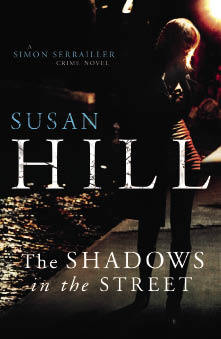In times of anxiety or confusion the most effective palliative is a good detective story. The requirement is that a sense of justice be restored, and, paradoxically, given the fictional events portrayed, a much desired sense of order. The effect is transitory but reliable.
It is also necessary that the protagonist be a man of principle. Such a one is the unassailably virtuous Simon Serrailler, Susan Hill’s detective hero, now making his fifth appearance in this agreeable series. He is, of course, no stranger to melancholy, largely in connection with his equally high-minded girlfriend from whom he is momentarily estranged. And he lives in Lafferton, a small fictional town which nevertheless boasts a cathedral, a college of further education and a hospice. He is revered by his colleagues, including the new detective sergeant whose eager suggestions are met with courteous constraint by his superior. For protocol addicts this is as it should be.
Things are somewhat troubled in Lafferton, more troubled than they have been in previous volumes. There are now prostitutes from eastern Europe in the streets, taking away custom from the home- grown variety. Nor are matters at the cathedral any better. The new dean’s wife is determined to open a drop-in centre for them in the crypt, and it does not help matters that she is a manic depressive. Indeed there is rather a lot of pathology in this novel, and this is not merely confined to the victims. Serrailler’s GP sister is uncharacteristically stricken after the death of her husband from a brain tumour, and the college librarian is seriously off his food, after being fingered by the police for his do-gooding activities among the prostitutes. Those who uphold the cathedral’s traditions are, naturally, sensible, honourable and even-tempered, even when faced with dismissal or redundancy.
The very high-minded Serrailler remains serene and detached amid the usual dysfunctional cast. He is also a talented draughtsman, with a contract for an exhibition of his work. And he lives alone, without any suggestion of frustration or regret, a very gentle parfit knight. This is in defiance of the usual stereotype of the hard-drinking loner, brooding over his recent divorce, like Kate Atkinson’s excellent Jackson Brodie. The result is an exceedingly old-fashioned story, not quite strong enough to stand on its own, but acceptable as part of an ongoing series.
After the third fatality, the business of detection takes precedence over goings-on at the Deanery. One suspect is exonerated, though nobody believes his innocence. There is evidence of remarkable misfortune among the inhabitants of Lafferton, a fugue here, a heart attack there, murderous thoughts where none previously existed, and for a considerable number of pages, no resolution in sight.
All this makes for a somewhat disheartening read, exacerbated by the expletives employed by the wrong-doers. It comes as a relief when the case is wound up and Lafferton can retreat into its normal harmlessness. Yet a malaise lingers, perhaps in the author’s desire to have done with it, to wrap up the loose ends, to bring everything to a neat conclusion. Unfortunately the conclusion is as daunting as the events preceding it. This may have something to do with Serrailler’s relative absence from the narrative. Without him the sense of rightness is missing.
Detective stories are in essence morality plays. Their appeal is to our archaic need for an answer, or, perhaps more importantly, for an explanation. Whether Susan Hill’s formula, with its comforting background of family and choir practice will fill this exacting requirement is another matter. Perhaps we need Simon Serrailler, in a sense our advocate or representative, to do more work, to spend less time at his Scottish retreat and more at the coal-face. It will be interesting to see him return to his duties. The next installment in the series could be crucial.






Comments